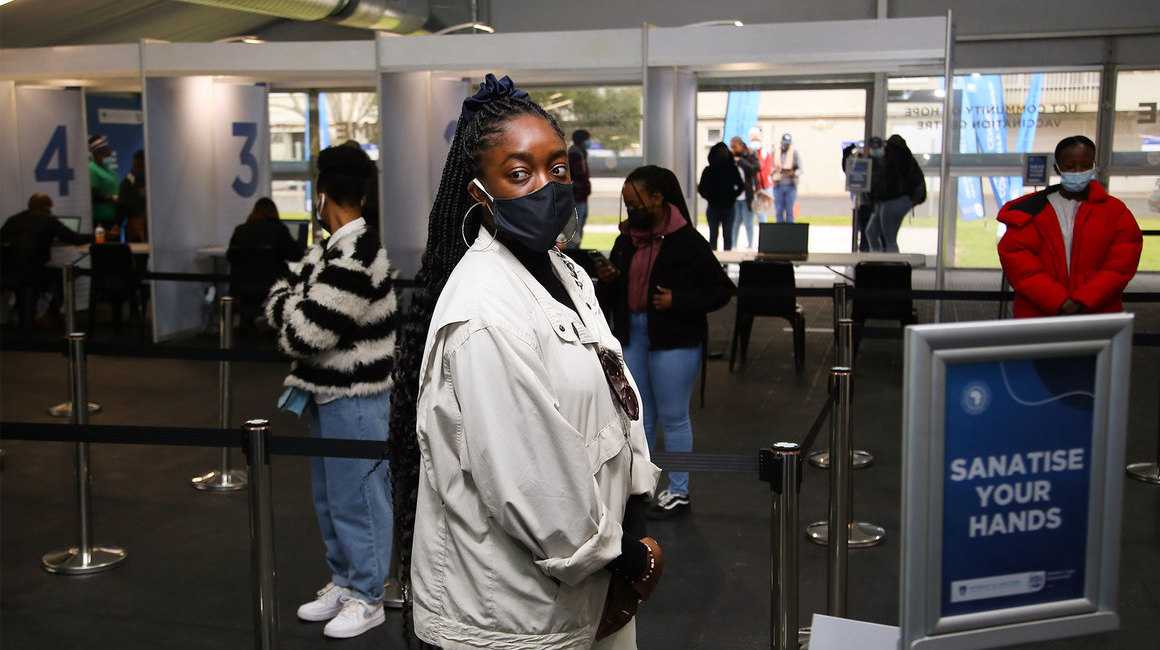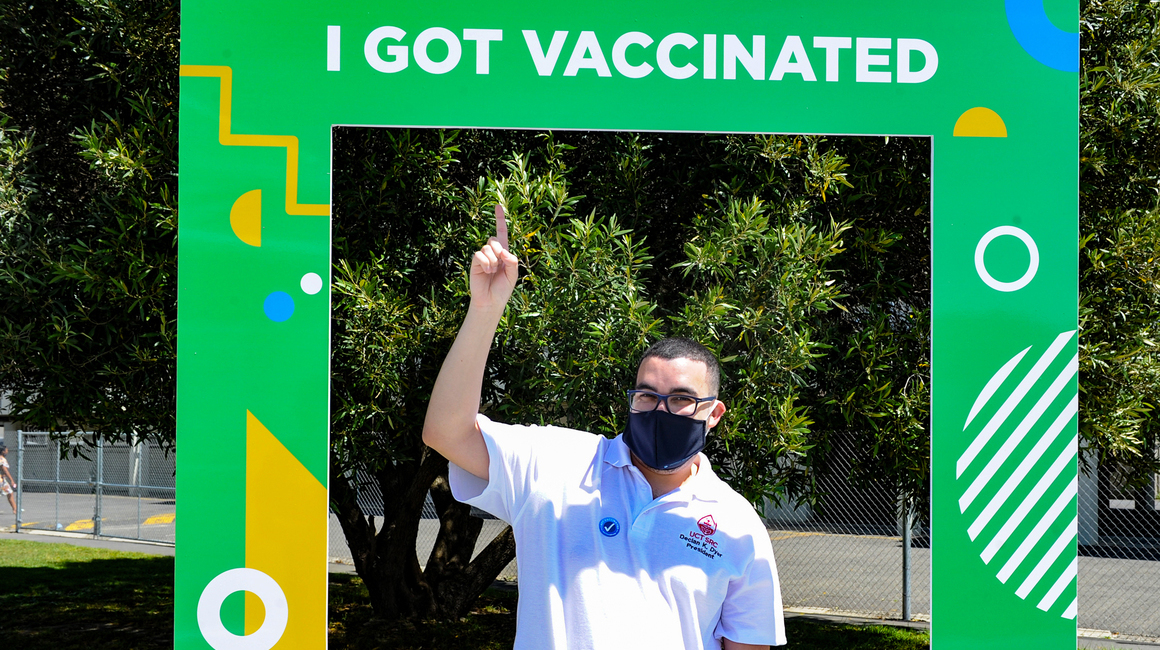Gauteng’s COVID-19 crisis is likely to worsen rapidly, unless…
22 June 2021 | Story Shabir A Madhi and Jonny Myers. Photo South African Tourism / flickr. Read time 6 min.
University of Cape Town (UCT) Emeritus Professor Jonny Myers (Public Health Medicine) and Professor Shabir A Madhi (Vaccinology, University of the Witwatersrand) delve into the COVID-19 crisis in Gauteng and suggest ways forward to urgently address the situation.
Gauteng, the province with the smallest landmass in South Africa, is home to 15.6 million (25%) of South Africa’s estimated 59.6 million population. Consequently, the trajectory of Covid-19 resurgences in Gauteng has a major influence on the national picture. Scientists (including one of the authors of this article) warned already in February 2021 as the second wave was receding, that South Africa was likely to experience another resurgence by late May to June 2021 — as has transpired. This educated prediction was premised on three major factors.
First, despite bold announcements by the government in early January 2021 that South Africa would rapidly vaccinate 40 million individuals by the end of 2021 (the goal post having since repeatedly shifted), this aspiration was doomed to fail in the absence of having actually tied down a supply of the much sought after Covid-19 vaccines.
Second, despite the high force of SARS-CoV-2 infection that likely transpired in South Africa during the course of the first two waves, the Beta variant that evolved in the country is relatively resistant to antibodies induced by infection due to the original virus. Coupled with this is likely waning of antibody (probably required to protect against infection and mild Covid-19), even following natural infection by the Beta variant.
This waning of antibody contributes to diminishing levels of community immunity to protect against SARS-CoV-2 infection where there is a high intensity of ongoing circulation of the virus (more likely when only a small percentage of the population is vaccinated even with highly efficacious vaccines), leading to further resurgences of Covid-19.
Third, considering 80% of SARS-CoV-2 infections are directly or indirectly related to super-spreader events resulting from gatherings, particularly in poorly ventilated indoor spaces, a resurgence was likely to transpire as people were more inclined to gather indoors as we headed into the winter months of the year. The risk of such super-spreader events occurring was probably exacerbated by a largely Covid-19 unvaccinated population (not due to any choice of its own) becoming more complacent about the use of face masks and other measures that could assist in dampening the rate of spread of the virus.
Despite the predictability of the resurgence, unfortunately, Gauteng health facilities are seemingly underprepared to deal with the spike of Covid-19 cases requiring hospitalisation. Across the private and public sector, daily reports indicated that severe Covid-19 cases are being “nursed” in emergency departments at some hospitals until such time as bed space may be freed up in the wards.
This includes receiving supplemental oxygen for up to three days while sitting on a chair in a cubicle shared with three other Covid-19 patients. This is already the case in at least one of the largest hospitals caring for Covid-19 patients during the past three weeks. Furthermore, the surge in severe Covid-19 cases is placing additional pressure on care and the availability of bed space for non-Covid-19 illnesses requiring hospitalisation.
The situation in Johannesburg is compounded by the closure of the 1,000-bed Charlotte Maxeke Johannesburg Academic Hospital (CMJAH), due to a fire that occurred on 17 April 2021. Seemingly, there remains an impasse between departments in the City of Johannesburg and the Gauteng Department of Health (GDoH) on how to expedite the phased re-opening of the facility, while patient care remains interrupted. Unfortunately, as severe disease and death rates due to Covid-19 lag behind those of generally reported cases, the forecast for Gauteng is one of a worsening situation — possibly for the next two to three weeks at least.
Nevertheless, the crisis being experienced in Gauteng regarding a shortage of “beds” to care for Covid-19 cases, is unnecessary and an unfortunate manifestation of inadequate planning to mitigate the consequences of the resurgence. The decommissioning of the Nasrec Covid-19 field hospital facility (which was expensive to operate and seemingly under-utilised during the past two Covid-19 waves), was likely undertaken with the knowledge that the billions of rands spent on building state-of-art Covid-19 treatment facilities developed using alternate building technology (ABT) would be available should a resurgence be experienced.
Despite delays in the completion of these Covid-19 treatment facilities, the majority have now been handed over to GDoH. This includes a 500-bed facility next to Chris Hani Baragwanath Academic Hospital (CHBAH). Other additional resources purposed by GDoH for Covid management include a 183-bed facility in Carletonville, 300 beds at George Mukhari hospital, 300 at Jubilee Mall (Hammanskraal) and 150 in Bronkhorstspruit.
Currently, the greatest pressure on available “beds” for Covid-19 cases is in the City of Johannesburg —largely driven by the closure of CMJAH. The pressure on the health system and healthcare workers in Gauteng can be addressed immediately by fully operationalising the CHBAH Covid-19 ABT facility.
Despite this particular facility being fully equipped with state-of-art equipment, only 100 of the 500 beds are commissioned for use. Furthermore, the facility is only being used to admit patients deemed to be clinically stable and recovering from Covid-19, despite being designed and equipped to provide high-level and intensive care. Unfortunately, it appears that the driver behind the overwhelming underutilisation of the facility is the lack of planning on how it (and probably others) would be staffed to ensure that available “beds” are more than just beds, but rather fit for purpose for which the facility had been designed.
Albeit late, this needs immediate remedial work. In addition to the redeployment of all staff that would otherwise have been working in Covid-19 wards at the now-closed CMJAH, there needs to be immediate mobilisation of provincial healthcare workers and those from further afield (including unemployed doctors and nurses) to ensure that quality care is provided at the Covid-19 treatment facilities built for that purpose.
The public demand to benefit from the investment that has gone into the building of Covid facilities and ensure they are immediately operationalised to maximum capacity should be non-negotiable. Also, opening and staffing of these Covid-19 facilities are the least that can be done to show gratitude and provide relief to the medical and healthcare professionals who have worked selflessly and tirelessly in adhering to their oaths to provide quality care to the ill over the past 15 months. The situation has come with immense stress, suffering and even loss of life among healthcare workers, which cannot be allowed to continue due to deficiencies in planning to provide better care to South Africans.


Note: Covid-19 deaths data usually lag the trends in numbers of Covid-19 cases by two weeks, and excess mortality data is currently only available for deaths until 11 June 2021.
The number of likely Covid-19 deaths in Gauteng based on South African Medical Research Council excess mortality estimates:
- First wave: 12,474 deaths through to 12 June 2021;
- Second wave: 10,971 deaths; and
- Third wave: 2,565 as of 19 June 2021.
Covid-19 deaths based on reported Covid-19 deaths:
- First wave: 3,811;
- Second wave: 4,489 and
- Third wave: 1,131 up to 19 June.
UCT’s response to COVID-19 in 2021
COVID-19 is a global pandemic that caused President Cyril Ramaphosa to declare a national disaster in South Africa on 15 March 2020 and to implement a national lockdown from 26 March 2020.
UCT is taking the threat of infection in our university community extremely seriously, and this page will be updated regularly with the latest COVID-19 information. Please note that the information on this page is subject to change depending on current lockdown regulations.

Global Citizen Asks: Are COVID-19 Vaccines Safe & Effective?
UCT’s Institute of Infectious Disease and Molecular Medicine (IDM) collaborated with Global Citizen, speaking to trusted experts to dispel vaccine misinformation.
If you have further questions about the COVID-19 vaccine check out the FAQ produced by the Desmond Tutu Health Foundation (DTHF). The DTHF has developed a dedicated chat function where you can ask your vaccine-related questions on the bottom right hand corner of the website.
IDM YouTube channel | IDM website
UCT Community of Hope Vaccination Centre
The University of Cape Town in partnership with the Western Cape Government (WCG) have reinforced our commitment to bringing hope to the residents of the Mother City with the launch of the world‑class Community of Hope Vaccination Centre that opened its doors on Monday, 30 August 2021.
The site is located on Main Road in Mowbray – in the Forest Hill Residence – and access is from Broad Street. The site is open every Monday to Friday from 08:00 to 15:00 and on Saturday from 09:00 to 13:00. Please allow time for attending to COVID-19 protocols and arrive as early as possible at the vaccination centre.
Frequently asked questions
News and views
Campus communications
2021
Media releases
Read more
UCT statements related to COVID-19 vaccinations
This is a space created for all formal bodies and structures within the university community to share their opinions on the need for a mandatory COVID-19 vaccine policy. Please note that some editorial judgement may be applied if the received statements go against any constitutional rights, and that no correspondence will be entered into, statements will be posted unedited and as received. Statements can be sent to opinions@uct.ac.za.
Commemorating a year of COVID-19
At midnight on 26 March 2020, South Africa went into the first nationwide hard lockdown. A year later, we remember those who have died and those who have been affected by COVID-19, as well as the pandemic’s effects across society and campus. We are especially grateful for the front-line health workers who have done so much for so many.
#UCTCOVIDPledge – social media elements
Customised Facebook frames and Instagram stickers are now available on those social media platforms. Watch the tutorial videos here to see how easily you can show your support for the #UCTCOVIDPledge.
In an email to the UCT community, Vice-Chancellor Professor Mamokgethi Phakeng said:
“COVID-19, caused by the virus SARS-CoV-2, is a rapidly changing epidemic. [...] Information [...] will be updated as and when new information becomes available.”
We are continuing to monitor the situation and we will be updating the UCT community regularly – as and when there are further updates. If you are concerned or need more information, students can contact the Student Wellness Service on 021 650 5620 or 021 650 1271 (after hours), while staff can contact 021 650 5685.












































































